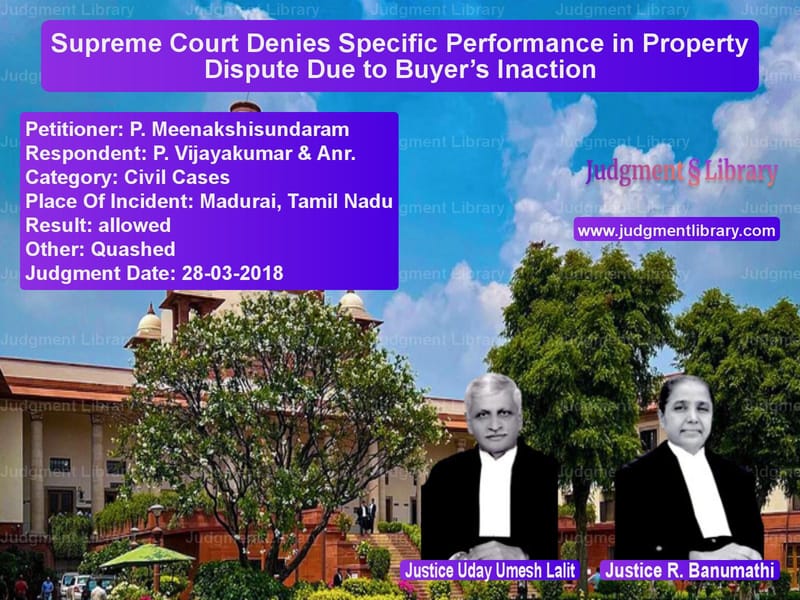Supreme Court Denies Specific Performance in Property Dispute Due to Buyer’s Inaction
The case of P. Meenakshisundaram vs. P. Vijayakumar & Anr. revolves around a dispute concerning a sale agreement of immovable property, where the buyer failed to fulfill his obligations within the stipulated time. The Supreme Court rejected the buyer’s plea for specific performance and ruled in favor of the seller, emphasizing the importance of compliance with contractual terms.
This judgment underscores the necessity for a buyer seeking specific performance to continuously demonstrate readiness and willingness to perform their part of the contract. The Court reaffirmed the principle that specific performance is an equitable remedy, not an absolute right.
Background of the Case
The dispute involved a property located in Madurai, Tamil Nadu. The appellant, P. Meenakshisundaram, entered into an agreement to sell the property to the respondent, P. Vijayakumar, for Rs. 37.5 lakh on September 20, 2000. The agreement also included movables from a marriage hall situated on the property. An initial advance of Rs. 1 lakh had already been paid, with an additional Rs. 5 lakh given on the same day.
The contract stipulated that the balance amount was to be paid and the sale deed registered by March 20, 2001. However, the transaction did not proceed as expected.
Claims of the Seller (Appellant – P. Meenakshisundaram)
- The buyer failed to pay the full amount within the stipulated time.
- Despite multiple extensions, the buyer was unable to complete the transaction.
- The buyer forcibly took possession of the property without legal entitlement.
- The sale agreement was lawfully canceled due to the respondent’s inaction.
Claims of the Buyer (Respondent – P. Vijayakumar)
- The buyer claimed he had paid Rs. 10 lakh to clear the bank loan on the property.
- He asserted that the seller had agreed to the arrangement and had handed over possession.
- He further alleged that he was always ready and willing to complete the sale.
- He sought specific performance of the agreement, demanding the execution of the sale deed.
Legal Issues Examined by the Supreme Court
Readiness and Willingness Requirement
The Court emphasized that a plaintiff seeking specific performance must prove continuous readiness and willingness to perform contractual obligations. It ruled:
“The buyer failed to show any communication or action indicating his intent to fulfill his obligations within the agreed timeframe.”
Failure to Comply with Contractual Obligations
The Court found that the buyer had:
- Not taken any steps towards completing the sale before March 20, 2001.
- Waited until September 22, 2001, to send a payment of Rs. 10 lakh, which was beyond the deadline.
- Claimed to have taken possession but failed to prove that he had met the financial terms of the agreement.
Unlawful Possession of the Property
The Court ruled that the buyer had unlawfully taken possession of the property and that the seller was entitled to reclaim it.
Judicial Precedents Considered
The Court referred to various precedents in property law and specific performance, including:
- Nathulal vs. Phoolchand (1970): The necessity of proving readiness and willingness in specific performance suits.
- Manjunath Anandappa vs. Tammanasa (2003): The requirement for a party to adhere strictly to contract terms.
- Sukhbir Singh vs. Brij Pal Singh (1996): Courts will not enforce specific performance when a buyer fails to fulfill payment obligations.
Final Judgment
- The Supreme Court dismissed the buyer’s suit for specific performance.
- The seller was directed to return Rs. 18 lakh to the buyer within three months.
- The buyer was ordered to vacate the property within one month.
- No additional compensation or mesne profits were awarded.
Key Takeaways
- Importance of Readiness and Willingness: A buyer must continuously demonstrate the intent to complete a property transaction.
- Adherence to Contract Terms: Courts will not enforce specific performance if deadlines are not honored.
- Possession Without Payment is Illegal: Buyers cannot take possession without fulfilling financial obligations.
- Judicial Precedents: The ruling reinforces established principles in property law regarding specific performance.
Conclusion
The Supreme Court’s ruling clarifies that property sale agreements must be honored strictly as per contractual terms. Buyers seeking specific performance must prove readiness and willingness throughout the contract period. The judgment serves as a strong precedent in real estate disputes, ensuring that legal obligations are met before seeking court intervention.
Petitioner Name: P. MeenakshisundaramRespondent Name: P. Vijayakumar & Anr.Judgment By: Justice Uday Umesh Lalit, Justice R. BanumathiPlace Of Incident: Madurai, Tamil NaduJudgment Date: 28-03-2018
Don’t miss out on the full details! Download the complete judgment in PDF format below and gain valuable insights instantly!
Download Judgment: P. Meenakshisundaram vs P. Vijayakumar & Anr Supreme Court of India Judgment Dated 28-03-2018.pdf
Direct Downlaod Judgment: Direct downlaod this Judgment
See all petitions in Property Disputes
See all petitions in Contract Disputes
See all petitions in Damages and Compensation
See all petitions in Judgment by Uday Umesh Lalit
See all petitions in Judgment by R. Banumathi
See all petitions in allowed
See all petitions in Quashed
See all petitions in supreme court of India judgments March 2018
See all petitions in 2018 judgments
See all posts in Civil Cases Category
See all allowed petitions in Civil Cases Category
See all Dismissed petitions in Civil Cases Category
See all partially allowed petitions in Civil Cases Category







